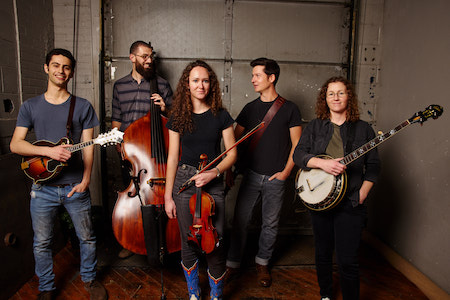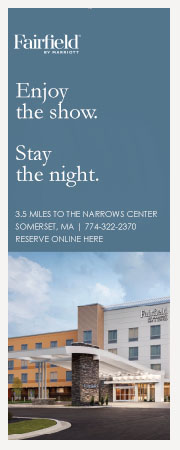Mile Twelve

Friday, April 14, 2023
$23 Advance | $25 Day of Show
Doors 7pm | Show 8pm
Mile Twelve is back in motion. From the first manic, dissonant downbeat of their virtuosic new record, Close Enough to Hear, you’ll discover a band that is ready to explode from a restless pandemic-induced hiatus. The first track “Romulus,” glides and rages as the narrator wrestles with the ultimate impermanence of the empire he’s forged.
Next comes the magical realism of “Johnny Oklahoma,” the youth who volunteers to be fired out of a cannon for the good of his community, in one big beautiful nihilistic burst. These musicians are clearly working through some hard questions posed by the last few years. You’ll hear the same warmth and innovation that earned the band IBMA’s 2019 Album of the Year nomination and 2020 New Artist of the Year Award, and that’s gained them an international reputation as one of the most dynamic groups in contemporary acoustic music. The title track “Close Enough to Hear,” is a stripped down dream of all that we missed so dearly in those early, terrifying months of lockdown.
$23 Advance | $25 Day of Show
Doors 7pm | Show 8pm
Mile Twelve is back in motion. From the first manic, dissonant downbeat of their virtuosic new record, Close Enough to Hear, you’ll discover a band that is ready to explode from a restless pandemic-induced hiatus. The first track “Romulus,” glides and rages as the narrator wrestles with the ultimate impermanence of the empire he’s forged.
Next comes the magical realism of “Johnny Oklahoma,” the youth who volunteers to be fired out of a cannon for the good of his community, in one big beautiful nihilistic burst. These musicians are clearly working through some hard questions posed by the last few years. You’ll hear the same warmth and innovation that earned the band IBMA’s 2019 Album of the Year nomination and 2020 New Artist of the Year Award, and that’s gained them an international reputation as one of the most dynamic groups in contemporary acoustic music. The title track “Close Enough to Hear,” is a stripped down dream of all that we missed so dearly in those early, terrifying months of lockdown.
Something else is close enough to hear on this new album. You’ll notice the presence of two new members: fiddler and vocalist Ella Jordan and mandolinist Korey Brodsky. Take note of the new dimension they add to the band, and their ability to lock in with founding members Evan Murphy (guitar, vocals), Catherine Bowness (banjo), and Nate Sabat (bass, vocals). These aren’t session players; this album captures the formation of a new coherent unit.
“Recording this album, our third full length, wasn’t easy,” says Murphy. “The pandemic froze the music industry for two years. We had undergone personnel changes. People who followed us couldn’t be blamed for wondering what, if anything, we might be up to. This was attempting a high jump from a total stand still, no running start.”
Both of the bands' previous full-length albums, as well as their guest star-packed EP, were recorded in Nashville. But the new challenges of traveling and dodging positive covid tests kept the band closer to home. They chose Sam Kassirer’s legendary Great North Sounds in the woods of Parsonsfield, Maine, a studio that’s played host to a murderer’s row of Americana acts and has become a fixture of the New England recording scene.
“I’m more proud of this album than anything else I’ve done to date,” says bassist Nate Sabat. “Listening back, I feel an undeniable urgency in the music. A fresh sound rushing out, wanting to be heard. The songwriting, arrangements, execution and aesthetic are all bullseye, and I couldn’t be more excited to share this music with our fans.”
This is a band looking forward — simultaneously shoring up their bluegrass foundations (in the transfixing a capella opening of “If Only,” for example) while also pushing their musical boundaries and driving into new territory. You’ll detect flavors of jazz (“Red Grapes on the Vine”), acoustic pop (“Take Me As I Am”) and trance music (“Light of Angels”). Heard as a whole, Close Enough to Hear displays the vast potential of acoustic string band music in the hands of capable players.
"Mile Twelve made fast gains for the first few years, like shiny young bluegrass bands do,” reflected Murphy. “We picked fast, sang high, and toured hard. Then it all crashed against the brick wall of Covid."
This album lets you listen in close to a band that decided to continue after all of that heartache -- a band that’s grown up a bit too. The vocals might be softer, the viewpoint a little weathered, but there’s no chasing of metronomes here, no tuning of vocals. Mile Twelve decided to stand back up and keep going, quietly delivering what very well may be its best album yet.
“Recording this album, our third full length, wasn’t easy,” says Murphy. “The pandemic froze the music industry for two years. We had undergone personnel changes. People who followed us couldn’t be blamed for wondering what, if anything, we might be up to. This was attempting a high jump from a total stand still, no running start.”
Both of the bands' previous full-length albums, as well as their guest star-packed EP, were recorded in Nashville. But the new challenges of traveling and dodging positive covid tests kept the band closer to home. They chose Sam Kassirer’s legendary Great North Sounds in the woods of Parsonsfield, Maine, a studio that’s played host to a murderer’s row of Americana acts and has become a fixture of the New England recording scene.
“I’m more proud of this album than anything else I’ve done to date,” says bassist Nate Sabat. “Listening back, I feel an undeniable urgency in the music. A fresh sound rushing out, wanting to be heard. The songwriting, arrangements, execution and aesthetic are all bullseye, and I couldn’t be more excited to share this music with our fans.”
This is a band looking forward — simultaneously shoring up their bluegrass foundations (in the transfixing a capella opening of “If Only,” for example) while also pushing their musical boundaries and driving into new territory. You’ll detect flavors of jazz (“Red Grapes on the Vine”), acoustic pop (“Take Me As I Am”) and trance music (“Light of Angels”). Heard as a whole, Close Enough to Hear displays the vast potential of acoustic string band music in the hands of capable players.
"Mile Twelve made fast gains for the first few years, like shiny young bluegrass bands do,” reflected Murphy. “We picked fast, sang high, and toured hard. Then it all crashed against the brick wall of Covid."
This album lets you listen in close to a band that decided to continue after all of that heartache -- a band that’s grown up a bit too. The vocals might be softer, the viewpoint a little weathered, but there’s no chasing of metronomes here, no tuning of vocals. Mile Twelve decided to stand back up and keep going, quietly delivering what very well may be its best album yet.






